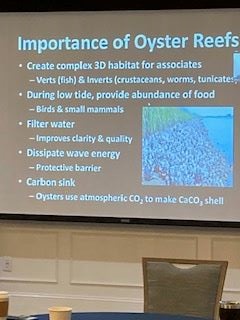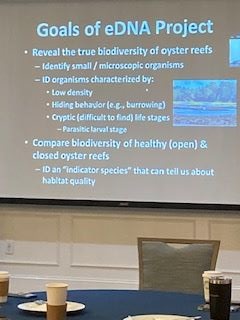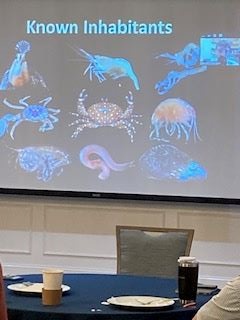President Kristin Keller called the meeting to order
Kevin Courtney offered the prayer and led the pledge to the flag
Announcements:
Celebration of Life Service for Francis Ferrene will be September 4 at First Presbyterian Church. Francis, who was an important participant in VLR activities and service, wanted all Rotarians to be invited to celebrate her life.
President Kristin shared a letter from Nancy Mace to Suzi Oliver, acknowledging her selfless gift of donating a kidney to someone she did not know. Suzi you are an exemplary Rotarian and humanitarian, thank you for all your contributions.
Run with Bernie still in progress. The VLR team is racking up the miles for polio.
There will be a ROCS coming up soon.
Social - First Social of the 2021-22 year will be on September 13 at Spanish Wells Club. Watch for more information.
Sergeant at Arms, Suzi Oliver collected Happy $$.
Speaker:
Dr. Mercer Brugler, USCB was the speaker and his topic was "Oyster Reef Biodiversity". Dr. Brugler is passionate about growing the USCB Marine Biology program and developing a Masters Program. He presented information about Oyster reef eDNA, Leech biodiversity, Black coral legevity; horseshoe crabs and climate change. He educated us about Environmental DNA (eDNA) which refers to all of the DNA that is shed or released currently or recently by organisms into the environment.


Samples of sea water are collected and they try to match the DNA to the sea animals that are potentially in the area. DNA of animals can also be collected from air sampling. There are potential issues with the DNA collection processes: incomplete reference databases; high sequence similarity between species; false negatives; false positives. The Oyster Reef project is funded by the Spring Island Trust. The Oyster reef is very important: creates complex 3D habitat for associates (fish, crustaceans, worms, etc); during low tiede provides abundance of food; filters water; dissipates wave energy, carbon sink- use atmospheric CO2 to make CaCO3 shell.

There are many known habitants of the oyster reef. Student Kristin Mullins assisted by sharing her favorite inhabitant which is the Sea Slug. She favors them because they are rare, they are grazers, eat algae and she wants to become an expert on them. The researchers go out on boats, deploy a horizontal water bottle, trap 2 liters of water, take back to lab to analyze. Leeches are another target of research with a grant to study them from USC. Interesting to learn that it has been 50 years since local leeches have been studied. They are found on sea turtles, sharks, skates, rays. Their blood is analyzed to see who they are feeding on. Black coral is 4265 years old and is being used to study longevity. Horseshoe crabs are used to harvest their blood for the medical field. Interspecies communication continues to be studied. You can find out more about this at: www.projectceti.org